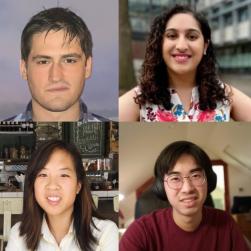CSE’S NSF PHD RESEARCH FELLOWS
Four graduate students in the UC San Diego Department of Computer Science and Engineering have received prestigious National Science Foundation (NSF) Research Fellowships. The new fellows will receive a $34,000 annual stipend for three years, a $12,000 education allowance to cover tuition and fees, and numerous professional development opportunities.
Founded in 1951, the NSF Graduate Research Fellowship Program is the country’s oldest effort to support graduate STEM students. Learn about the new NSF fellows from CSE and the research they are conducting.
Alex Trevithick
Advised by Ravi Ramamoorthi, Trevithick works in the UC San Diego Center for Visual Computing and is developing advanced techniques to extrapolate novel views from a single input. He combines an approach called neural radiance fields for view synthesis (NeRF) with other techniques to infer colors and geometries in unseen regions. His long-term goals are to advance visual intelligence, creating views from occluded parts of images. The project can be applied in robotic locomotion and other areas.
Alisha Ukani
Network measurement provides insights into the performance of critical infrastructure, such as large scale data centers, making services faster and more reliable and better tailoring them to users’ needs.
Advised by Alex Snoeren, Ukani analyzes network traffic and reliability data. Her work has provided new insights into people’s online behaviors during COVID-19, as well as helping detect data center outages more quickly at Google. Ukani wants to continue her measurement research to improve people’s Internet experiences.
Olivia Weng
Weng focuses on using hardware/software co-design to create efficient, fault-tolerant computer architectures for machine learning. One example is the Large Hadron Collider, where physicists need hardware that will process millions of particle collisions per second. Her research will allow their hardware, and the machine learning software that runs on it, to meet these intense computing demands while resisting radiation.
Weng is supported by her advisor, Ryan Kastner. This award will allow her to freely collaborate with researchers in particle physics, machine learning and computer architecture.
Alex Yen
Yen’s work focuses on infrastructure analyses, and he is now investigating a large-scale Internet-of-Things (IoT) network built by Helium. Advised by Pat Pannuto, Yen and colleagues want to better understand the network’s operation, adoption, performance and efficacy. He is also working on analyzing electric grid infrastructure, building a camera-based system that uses machine learning and computer vision to examine grids, particularly in developing nations. By analyzing images from street and house lights, he and colleagues can infer grid properties.
Written by Josh Baxt
